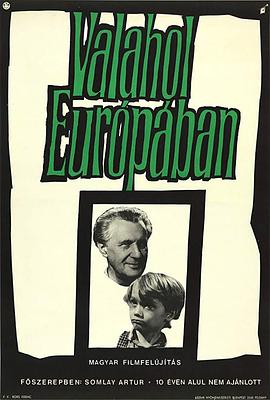欧洲的某个地方3.0
又名:ouzhoudemougedifang
扫一扫手机看
简介
Somewhere in the remote region, the war ends. In the midst of ruined cities and houses in the streets, in rural hamlets, everywhere where people still live, are children who have lost their homes and parents. Abandoned, hungry, and in rags, defenseless and humiliated, they wander through the world. Hunger drives them. Little streams of orphans merge into a river which rushes forward and submerges everything in its path. The children do not know any feeling; they know only the world of their enemies. They fight, steal, struggle for a mouthful of food, and violence is merely a means to get it. A gang led by Cahoun finds a refuge in an abandoned castle and encounters an old composer who has voluntarily retired into solitude from a world of hatred, treason, and crime. How can they find a common ground, how can they become mutual friends? The castle becomes their hiding place but possibly it will also be their first home which they may organize and must defend. But even for this, the price will be very high.
To this simple story, the journalist, writer, poet, scriptwriter, movie director, and film theoretician Béla Balázs applied many years of experience. He and the director Géza Radványi created a work which opened a new postwar chapter in Hungarian film. Surprisingly, this film has not lost any of its impact over the years, especially on a profound philosophical level. That is to say, it is not merely a movie about war; it is not important in what location and in what period of time it takes place. It is a story outside of time about the joyless fate of children who pay dearly for the cruel war games of adults.
At the time it was premiered, the movie was enthusiastically received by the critics. The main roles were taken by streetwise boys of a children's group who created their roles improvisationally in close contact with a few professional actors, and in the children's acting their own fresh experience of war's turmoil appears to be reflected. At the same time, their performance fits admirably into the mosaic of a very complex movie language. Balázs's influence revealed itself, above all, in the introductory sequences: an air raid on an amusement park, seen in a montage of dramatic situations evoking the last spasms of war, where, undoubtedly, we discern the influence of classical Soviet cinematography. Shooting, the boy's escape, the locomotive's wheels, the shadows of soldiers with submachine guns, the sound of a whistle—the images are linked together in abrupt sequences in which varying shots and expressive sharp sounds are emphasized. A perfectly planned screenplay avoided all elements of sentimentality, time-worn stereotypes of wronged children, romanticism and cheap simplification. The authors succeeded in bridging the perilous dramatic abyss of the metamorphosis of a children's community. Their telling of the story (the scene of pillaging, the assault on the castle, etc) independently introduced some neorealist elements which, at that time, were being propagated in Italy by De Sica, Rossellini, and other film artists. The rebukes of contemporary critics, who called attention to "formalism for its own sake" have been forgotten. The masterly art of cameraman Barnabás Hegyi gives vitality to the poetic images. His angle shots of the children, his composition of scenes in the castle interior, are a living document of the times, and underline the atmosphere and the characters of the protagonists. The success of the picture was also enhanced by the musical art of composer Dénes Buday who, in tense situations, inserted the theme of the Marseilaise into the movie's structure, as a motive of community unification, as an expression of friendship and the possibility of understanding.
Valahol Europaban is the first significant postwar Hungarian film. It originated in a relaxed atmosphere, replete with joy and euphoria, and it includes these elements in order to demonstrate the strength of humanism, tolerance, and friendship. It represents a general condemnation of war anywhere in the world, in any form.
猜你喜欢
-
更新至第06集
瑞草洞
主演:李钟硕,文佳煐,姜有锡,柳慧英,林成宰,尹均相,金度勋 -
更新至第01集
能面检察官
主演:上川隆也 -
更新至第01集
甜心医生
主演:泰钦·派伊桑皖,查维缇彭·普颂基缇萨库尔,塔巴纳瓦·高根鲁,坦那瓦·苏迪扎伦,Arm Chaiyapat Jumpasin,Top Sumethee,李龙世 -
更新至第09集
牵牛和仙女
主演:赵怡贤,秋泳愚,车康允,秋瓷炫,尹炳熙 -
更新至第01集
退货儿童
主演:廉晶雅,元真儿,金珍荣,李娜恩,安智浩 -
HD
冲动2023
主演:玛丽亚·露可安诺娃,杰拉·奇塔瓦,Daro Akimidze,Koba Akimidze,Aleksandr Cherednik,Christina Chernyavskaya,Anna Grigoryeva,Ivan Ivashov,Dmitry Khalileyev,Issa Khasatsov,Stasya Khomeriki-Grankovskaya,Dmitry Khromyh,Islam Kurukov,克塞妮娅·库捷波娃,Albert Misirov,Anna Mustina,Nikolay -
HD
无尽假期
主演:达里亚·萨维列娃,鲍丽娜·库捷波娃,伊琳娜·诺索娃,Magoga Machulskaya,Marfa Ivanova,Egor Leontev,安德烈·佩尔米亚科夫,Serafima Frolova,Kira Satunkina,Ekaterina Tkachuk,Polina Khodzhevanova,Angelina Bokova,Mikhail Bychkov,Maksim Vorozhnin,Mariya Minenkova,Aleksey Fokin,拉丽萨·马基娜 -
HD
冰河的诅咒
主演:罗伊·麦克凯恩,希欧布罕·芬内朗,乔·科尔,弗朗西斯·麦基,奥黛莎·杨,图尔洛夫·科维里,刘易斯·格里本,迈克尔·奥·莱恩,Guillermo Uria,Andrean Sigurgeirsson -
已完结
同窗会1993
主演:齐藤由贵,田中美奈子,西村和彦,高岛政宏,山口达也,荻野目庆子 -
更新至第17集
带剑女孩
主演:洪凌,许瑞奇,戚玉武,黄俊雄,邓伟德,郭坤耀,黄晶玲,郑颖,曾诗梅,黎沸挥,杨世彬,徐鸣杰,林昭婷,曾文伟,郑六月,卓芳娴,梁嘉靖 -
更新至第02集
爱的学校。
主演:木村文乃,拉乌卢,田中美奈实,中岛步,凉,筒井真理子,酒向芳,泽村一树,味方良介,野波麻帆,早坂美海,坂口涼太郎,荒井启志,别府由来,吉濑美智子 -
更新至第03集
量产型Ruka -模型社员的蔚蓝逆袭-
主演:贺喜遥香,筒井彩萌,山崎竜太郎,小林桃子,尾本侑树奈,冈田义德

